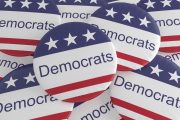In a note to his readers on February 15th Roger Stone (left) announced his resignation from the Republican Party, changing his voter registration to the Libertarian Party. A self-proclaimed “GOP hit-man,” Stone became involved in politics in his teens, working for President Nixon’s reelection campaign in 1972 (known as the Committee to Re-elect the President, or CREEP), serving as the National Director of Youth for Reagan in 1976 and then as the Young Republican National Chairman from 1977 to 1979. He worked for the Reagan presidential campaign in 1980 and in 1984 and then for Jack Kemp’s campaign for president in 1988.
In so doing Stone left behind a legacy of political dirty tricks and outrageous shenanigans that in some cases altered American political history. He was born with the ability to observe a situation and then see how to take advantage of it. In the first grade his first political trick was to support John F. Kennedy in his campaign against Nixon in 1960. He brags: “I remember going through the cafeteria line and telling every kid that Nixon was in favor of school on Saturdays. It was my first political trick.” When he ran for election as president of his high school senior class he said he “built alliances and put all my serious challengers on my ticket. Then I recruited the most unpopular guy in the school to run against me. You think that’s mean? No, it’s smart!”
He saw an opportunity for another trick during Nixon’s campaign in 1972. He adopted the name Jason Rainer and made contributions in the name of the Young Socialist Alliance to Pete McCloskey’s campaign (McCloskey was Nixon’s challenger in the primary). He then sent the receipt to the Manchester Union Leader to “prove” that McCloskey was in fact a left-wing stooge.
Later on Stone hired a GOP staffer, gave him the pseudonym Sedan Chair II, who wound up serving as George McGovern’s chauffeur creating in information pipeline directly to the Nixon campaign.
Perhaps the most outrageous, and historically important, of Stone’s tricks, known as the “Brooks Brothers riot,” took place in Miami-Dade County, Florida on November 21st, 2000, during the recount of ballots in the Presidential election. The Florida Supreme Court had just ruled in favor of Al Gore to allow a recount but it had to be completed by November 26th. Stone saw his opportunity to delay the recount until after the 26th by bringing in GOP staffers to protest the recount. In an interview with The New Yorker magazine, Stone told what happened:
The whole idea behind what [we] were doing was that there had already been one recount of the votes so we [the Bush campaign] didn’t want another. The idea was to shut it down, stop the recount here in Miami…
We set up a Winnebago trailer. I set up my command center. I had walkie-talkies and cell phones and I was in touch with our people in the building. Our whole idea was to shut the recount down. That was why we were there…
There was a Brooks Brothers contingent [people dressed to look like business executives in Brooks Brothers clothing] but the crowd in front of the courthouse was largely Spanish…
The resulting confrontation led to riots which prompted the recount officials to stop the recount, depriving Gore of his best opportunity to overtake Bush in the narrow Florida, and national, vote.
Stone’s initial support of George W. Bush began to fade, expressing his dissatisfaction to Benjamin Sarlin after the elections in November, 2008:
I think across the board he’s led the party to its current position, which means losing both houses of congress and now the White House. How can you be conservative and justify wiretapping people without a warrant? We’re supposed to be the party of personal freedom and civil liberties. Big brother listening in on your phone calls – I got a problem with that.
In his letter outlining his reasons for leaving the Republican Party, Stone noted: “Sadly the difference between the two major parties has become rhetorical. Under the Democrats you’re going to hell. Under the Republicans you are still going to hell but you are going more slowly.” He added:
To real conservatives the freedom of the individual is paramount. No one should be able to tell you what you can eat, drink, smoke, or marry, or what kind of gun you can own. We don’t want to be snooped on by an all-knowing big brother government. That is the essence of liberty. The Republican Party has become both a party of big government but also an authoritarian party that would tell us how to live…
The Libertarian Party stands for both economic and personal freedom. Libertarians oppose spending, debt, taxes, big government, and costly foreign wars where our national interests are not clear. We support a woman’s right to choose an abortion, gay marriage equality, and the legalization of marijuana.
The Ron Paul revolution shows me a Libertarian moment is coming. It will gather momentum in 2012 and most likely manifest itself in 2016. Ron Paul’s incredibly strong support among young voters is the tip-off. American voters have never been offered a presidential candidate who took conservative positions on fiscal issues like spending, debt, and taxes, while taking freedom-based (i.e. liberal) positions on choice, gay marriage, and drug-law reform. This is clearly where a majority of Americans are.
Stone apparently makes no distinction between the constitutionalist libertarian, Dr. Ron Paul, who would leave social and moral issues to the states, and those more liberal libertarians adamantly opposed to any regulation of personal behavior, even at the local level.




